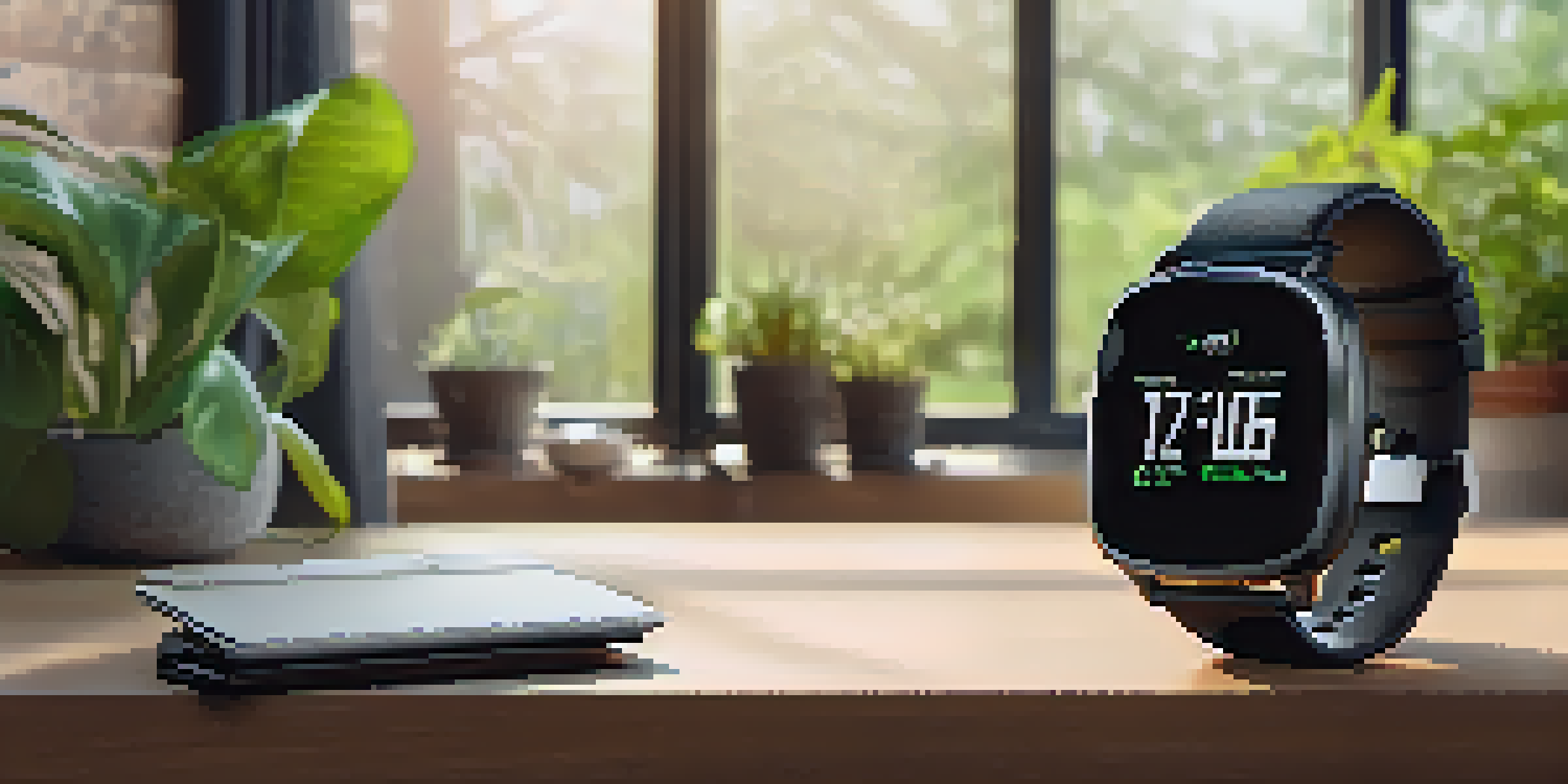Smart Wearables: The Future of Personalized Health Tracking

Understanding Smart Wearables and Their Impact on Health
Smart wearables are devices like fitness trackers and smartwatches that monitor various health metrics. They offer insights into our physical activity, sleep patterns, and even heart rate, making health management easier than ever. With technology advancing rapidly, these devices are becoming more sophisticated and user-friendly.
The greatest wealth is health.
Imagine having a personal health assistant on your wrist that tracks your steps, calories burned, and even stress levels throughout the day. This convenience allows individuals to take charge of their health, setting personal goals and receiving feedback on their progress. It’s like having a coach cheering you on, but without the judgment.
As more people adopt these gadgets, the potential for personalized health insights grows. Data collected from wearables can help identify trends and pinpoint areas for improvement, ultimately empowering users to lead healthier lives.
The Technology Behind Smart Wearables
At the heart of smart wearables is a combination of sensors and software that work together to capture and analyze health data. These devices often include accelerometers, heart rate monitors, and GPS, which provide a comprehensive view of your activity levels and health status. Think of these sensors as the eyes and ears of your wearable, constantly gathering data.

The data collected is then processed by algorithms that make sense of the numbers, transforming them into actionable insights. For instance, if your wearable detects irregular heart rates, it can alert you to seek medical advice, acting as an early warning system. This technology bridges the gap between fitness and medicine.
Smart Wearables Enhance Health Tracking
These devices provide personalized insights into physical activity, sleep, and health metrics, empowering users to manage their health effectively.
Moreover, as artificial intelligence continues to evolve, the capabilities of wearables are set to expand. Future wearables may be able to predict health issues before they arise, shifting the focus from reactive to proactive health management.
Personalization: Tailoring Health Insights Just for You
One of the most appealing features of smart wearables is their ability to personalize health tracking. Each user has unique health goals, and wearables can adapt to these needs, whether it’s weight loss, improved sleep, or enhanced athletic performance. It’s like having a custom-tailored suit that fits perfectly with your body’s needs.
Technology is best when it brings people together.
By analyzing your activity patterns and health metrics, these devices can offer personalized recommendations and reminders. For instance, if you’ve been sitting for too long, your wearable might suggest a quick walk to get your blood circulating. This level of personalization empowers users to make informed decisions about their health.
Additionally, syncing wearables with mobile apps allows users to track their data over time, creating a comprehensive health profile. This ongoing analysis helps users adjust their goals as they progress, ensuring they remain motivated and engaged on their health journey.
The Role of Data in Health Management
Data is the backbone of smart wearables, providing valuable insights into your health. By collecting and analyzing information, wearables help users understand their body better, promoting informed lifestyle choices. It’s like having a personal diary that not only tracks what you eat and how you exercise but also reflects on how you feel.
Moreover, this data can be shared with healthcare professionals, enhancing the doctor-patient relationship. Imagine walking into your appointment with a clear, data-driven overview of your health metrics. This transparency can lead to more tailored medical advice and better health outcomes.
Future Innovations in Health Tech
Advancements in smart wearables will lead to real-time health monitoring and integration with telehealth services, improving healthcare accessibility.
However, it’s essential to approach data privacy with caution. Users should be aware of how their data is being used and ensure they are comfortable with sharing it, maintaining control over their personal health information.
Challenges and Limitations of Smart Wearables
While smart wearables offer many benefits, they also come with challenges and limitations that users should be aware of. Battery life is often a concern, as frequent charging can disrupt the user experience. It’s similar to having a great gadget that you can’t fully enjoy because you’re always looking for a charger.
Additionally, the accuracy of health metrics can vary between devices, leading to potential misinformation. For example, some wearables may overestimate calorie burn or step count, which can be frustrating for users trying to reach specific health goals. It’s important to recognize that wearables are tools to assist, not definitive medical devices.
Moreover, there’s a learning curve associated with using these devices effectively. Users need to invest time in understanding their features and how to interpret the data, which can be daunting for some. However, with practice, many find that the insights gained are well worth the effort.
The Future of Smart Wearables in Healthcare
The future of smart wearables looks promising, especially in the realm of healthcare. As technology continues to evolve, we can expect even more advanced features that provide deeper insights into our health. Picture wearables that not only track physical activity but also monitor vital signs in real-time, alerting users and healthcare providers of potential health risks.
Furthermore, integration with telehealth services is becoming more common. This means that doctors can monitor their patients’ health remotely, leading to more timely interventions when issues arise. Such connections can lead to improved patient outcomes, making healthcare more efficient and accessible.
Data Privacy Matters for Users
While wearables offer valuable health insights, users must be cautious about data privacy and how their information is shared.
As we look ahead, the potential for smart wearables to revolutionize health tracking and management is immense. With ongoing research and development, these devices could become essential tools in maintaining our wellbeing, guiding us toward healthier lifestyles.
Embracing Smart Wearables for a Healthier Future
Incorporating smart wearables into your daily routine can be a game-changer for your health journey. They provide insights, motivation, and accountability, helping you stay on track with your health goals. Just like a trusted friend who encourages you to stay active, wearables can play a significant role in fostering healthier habits.
Moreover, as technology becomes more integrated into our lives, embracing these innovations can lead to better health outcomes. Whether you’re an athlete looking to optimize performance or someone seeking to improve your overall wellness, there’s a wearable out there for you. It’s all about finding what fits your lifestyle best.

In conclusion, smart wearables are not just a trend; they are a reflection of our evolving approach to health and wellness. By harnessing the power of technology, we can take proactive steps toward a healthier future, one step at a time.